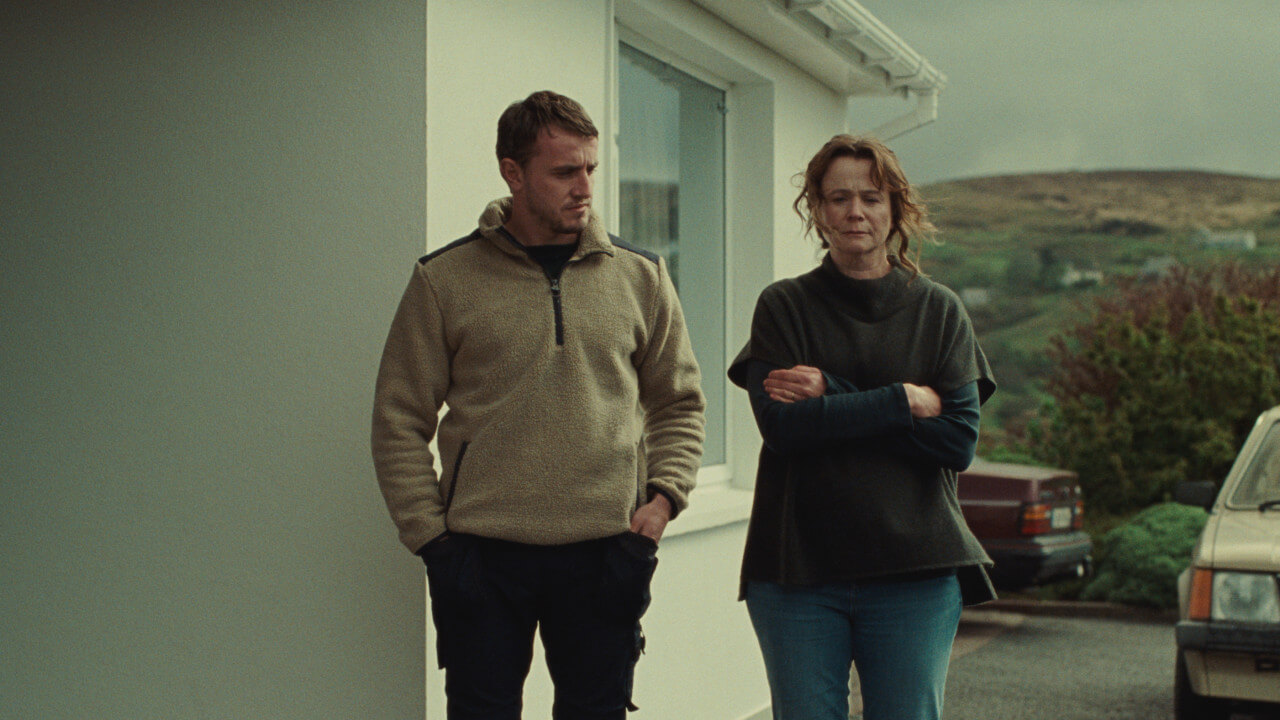A much anticipated A24 film, God’s Creatures tells the story of an Irish family torn apart by a mother’s decision to lie for the sake of her son. Starring Emily Watson and Paul Mescal, the movie is particularly effective in its evocation of the Irish countryside – the rocky, green promontories, Irish folk songs, and community traditions and vocations (most characters work in seafood production) give the movie a local, small town energy. One character observes early in the film that no one learns how to swim in their town to make sure if someone falls into the ocean, no one will go after them. This was probably my favorite line in the movie, both for its bleakness and the superstition we feel hanging over the rural fishing community. The landscape is filmed beautifully throughout, and co-directors Saela Davis and Anna Rose Holmer pay particular attention to the deceptive movements of the sea, fluttering lightly on top but clearly tugging at the characters with dangerous strength underneath.
The movie as a whole is very well made and performed. The central conflict is compelling and provocative, its score is an effectively atonal, eerie combination of violin notes and simple percussive lines, and the writing is never awkward or overbearing. The actors, too, are all great, often holding their emotions just beneath the surface so that when they do snap at each other it’s shocking. But the infrequency of such moments was noticeable to me, and if I were to make one criticism of the movie it’s that I think its stakes could have been raised to even higher heights. A character makes a crucial decision in the second half of the movie that marks a deviation from all of their previous behavior, and not enough pressure had been placed on them to make such a sudden change believable. There could’ve been a bit more meat on the movie’s fish bones (sorry) as it runs at a sleek 94 minutes and ends somewhat abruptly, though the final shot is powerful and left me with some sense of resolution, even if I had wished the movie went further into the depths than it did.
The synopsis on the Cannes website made me wonder about this question of stakes, as it claims the movie is about a “close-knit community” being “ripped apart” by Emily Watson’s lie. But no such community-collapse happens in the movie. The ripping happens at the family level, and though certain actions might have been more understandable had the community been more up in arms, the scenes within the family are strong enough to keep the movie afloat.

The movie I saw next made good on what the God’s Creature’s synopsis promised, showing a collapse of both a family and a community, though through a more farcical lens. The Woodcutter’s Story is a Finnish movie from debut filmmaker Mikko Myllylahti that tells the story of a woodcutter named Pepe who loses everything dear to him over the course of a few days. The movie is truly bizarre from its opening scene, but its strangeness is rarely alienating. The monotone way the characters talk, their habit of standing completely still in rooms, not speaking or moving until Pepe approaches them, somehow work. The movie is also funny, in an effortless, dry way I found very charming. There’s a character in the second half who is a “singing medium,” who connects to his audience members’ dead loved ones through song. It’s played off humorously but not cynically – Myllylahti walks a fine line between satire and mockery. Many of the supporting characters ask questions throughout the film along the lines of “why are we here?” “What is the purpose of life?” “Where are we going?” And though they’re made to look funny in their self-seriousness, the movie doesn’t dismiss their questions entirely. Miracles and other seemingly inexplicable events happen throughout the movie, standing in contrast with the sense of abandonment and existential doubt many of the supporting characters express.
I described the movie to a friend as a kind of philosophical thought experiment. Pepe seems to me a representation of a Camus-like figure, constantly optimistic but not relying on spirituality or an abstract thesis on “life’s meaning” to justify his existence. Life is beautiful to him in and of itself. I actually ended up loving this movie, if only because it’s exciting to see a director make very bold, weird decisions, and to do it with an elegance and visual aesthetic both hilarious and often beautiful.
